|
Thomas Mott Osborne's Within Prison Walls©
CHAPTER II: WHY I WENT TO PRISON
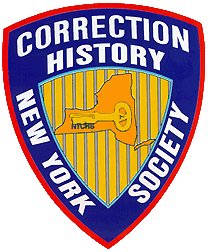 | An
NYCHS
Excerpts
Presentation
Page 4 of 18 |
September 28, 1913. 9:30 P.M.
All is ready for my great adventure. Indeed the first steps have been taken. This morning I went down to the Prison to speak at the chapel exercises as planned; but arrived early, about nine o'clock, at Warden Rattigan's request, in order to inform the Chaplain as to what I am proposing to do. He seemed very much surprised and pleased. The Warden also explained the matter to the Principal Keeper; but I shall not attempt to venture a guess at his feelings, for I was not present. I can imagine, however, that the official view may not be one altogether in sympathy with my experiment. The official mind, as a rule, prefers to have things viewed strictly from the "congregation side;" it does not approve of interlopers behind the scenes; which is not, perhaps, altogether unnatural.
When the prisoners are all assembled, the Chaplain leads the way and we walk down the aisle of the chapel or assembly room -- the latter name seems more appropriate, as there is very little there to suggest religion. Ascending the platform, we are greeted by a cordial round of applause; the men have apparently not forgotten my talk to them in the yard last July, when I explained what our Prison Reform Commission hopes to accomplish, and asked their assistance.
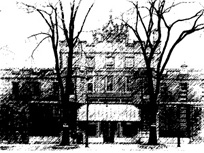 | | Auburn (sketches above and below based on vintage photos) is the oldest NYS prison still in operation. NY's first state prison, Newgate in New York City's Greenwich Village, opened in 1797 but became overcrowded within five years. When the legislature authorized building a second prison to relieve that overcrowding, Auburn citizens donated land as an investment in the local economy.
The site -- along the Owasco Inlet on the outskirts of town -- had
been used as a British POW camp during the War of 1812. The prison's cornerstone was laid in June of 1816. While work on building it continued through the summer and autumn, the project moved more rapidly once inmates began arriving from Newgate in April, 1817. By 1823, the institution was basically completed as a physical structure.
But many more years went into constructing what the world has come to know as the Auburn System:
- separate confinement of inmates (the first to use separate cells),
- congregate work during the day,
- enforced silence,
- lockstep walking,
- striped uniforms, and
- use of the lash as punishment.
Because of the great interest that this new system excited among those involved in law, government and social services, Auburn influenced the way other prisons in other states -- indeed, in other countries too -- came to be operated.
An excellent historical profile on Auburn Correctional Facility has been written by NYS Dept. of Correction Services public information office staffer Austin Clarke, one of NYCHS founders. His articles profiling the various facilities in the state system are a regular feature in the agency's monthly news magazine DOCS Today. Richly researched, keenly perceptive and skillfully written, they are recommended reading for anyone interested in NY correction history.
Many of Clarke's Facility Profile essays appear on Sullivan Correctional Facility C.O. Ed Kasper's web site, including the one profiling Auburn prison published in theApril, 1998 issue of DOCS Today.
[Image selection & caption by NYCHS webmaster]
| 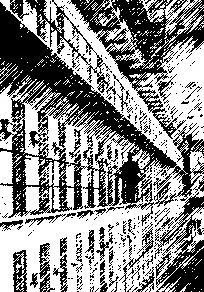 |
I take my seat upon the platform and, while awaiting my turn to speak, endeavor to listen to the service. Before me sit rows and rows of men in gray trousers and faded shirts, upward of 1,300 -- not a full house, for a considerable number are out in the road building camps. Gray predominates -- not only in the gray clothes, but in the heads and faces. There are a few bright spots of youth and manly vigor, and some black Negro heads, but the general impression is gray; gray, and faded, and prematurely old. It is a sad audience, to which a sinister aspect is given by the sight of the guards -- silent, alert, blue-clothed figures, youthful for the most part, seated with watchful eyes and weapons handy, each in a raised chair near his own particular company.
But, although a sad audience to look upon, it is, as I have found on previous occasions, a most wonderfully sensitive and responsive audience to address. Each point of the discourse is caught with extraordinary quickness, every slight attempt at humor is seized upon with pathetic avidity. The speaker soon finds himself stimulated and carried along, as by a strange and powerful force he has never felt before. It is an exciting and exhilarating experience to talk to a prison audience; but one must take good care not to be a bore, nor to try any cheap oratorical tricks; for it is not only a keen and critical audience, it is a merciless one.
This morning I am not at all afraid of boring the hearers; but I do wonder whether they will fully take in my meaning; and how those who do understand will like the idea of my coming among them; and if some of them understand and sympathize, will it be a few only, or a majority; and if a majority, how large; and will the minority resent it sufficiently to be disagreeable?
These are some of the questions which go buzzing through my mind as I sit trying in vain to listen to the singing of the prison choir and the Scripture lesson which the Chaplain is reading. Finally I am called upon to speak; and as I advance to the front of the stage another round of applause comes from the audience. It has rather a startling effect upon one, for applause in the prison chapel has always somewhat the character of an explosion -- an explosion of pent-up feelings denied any ordinary freedom of expression. Handclapping is the only form permitted, and it sounds like the snapping of firecrackers.
I advance to the front of the stage and stumble through the first words of explanation as to the reasons for having my speech carefully written out -- in order to avoid any possible misunderstanding afterwards as to what I really have said. Then I clear my throat and read the address which follows
The Superintendent of Prisons and Warden Rattigan have kindly given me permission to carry out a plan which has been in my mind for some time; and to carry it out successfully I need your cooperation -- both officials and prisoners.
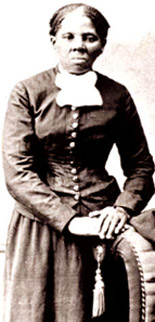
Harriet Tubman | ALSO IN 1913 . . .
About seven months before Thomas Mott Osborne began the brief life of Auburn Prison inmate Tom Brown #33,333x, the long life of Harriet Tubman drew to a close at her home in Auburn.
Tubman first became acquainted with Auburn through her pre-Civil War underground railroad activity helping slaves flee to freedom.
The UGRR had many "station hands" in the Syracuse region including several sympathetic Quakers and other abolitionists at Auburn.
The village also was the home of US Senator and former Gov. William H. Seward whom Tubman met in the mid-1850s. The Sewards provided a home for Tubman's favorite niece, Margaret, whom Tubman helped escape from Maryland. In 1857, the Sewards provided a home for Tubman, to which she relocated her parents from Canada. It was later sold to her for a small sum, and became her operations base.
During the Civil War, Tubman served as a soldier, spy, and a nurse. After the war, she returned to Auburn, married Nelson Davis, and lived in a home they built on South Street, near the original house. This house still stands on the property, and serves as a home for the Resident Manager of the Harriet Tubman Home.
In 1908, she built the wooden structure that served as her home for the aged and indigent. Here she worked, and herself was cared for in the period before her death on March 10, 1913, at the approximate age of 93.
Burial was in Fort Hill Cemetery in Auburn, with military honors. On June 14, 1914 a large bronze plaque was placed at the Cayuga County Courthouse, and a civic holiday declared in her honor.
The Harriet Tubman Home has been a Registered National Historic Landmark since 1975. The historical site serves as a meeting place for youth conferences and a cultural enrichment center. Visit the Tubman Home page of Tour Auburn web site for contact information, schedule and other details.
[Image selection & caption by NYCHS webmaster]
| 
Tubman Home in Auburn. |
As most of you doubtless know, I am chairman of the Commission on Prison Reform appointed by Governor Sulzer to examine into the Prison System of New York State, determine what changes would be desirable and formulate legislation necessary to bring about such changes. . . .
It must be evident that any such examination, seriously undertaken, is an extremely complex and difficult matter. Not only are trustworthy statistics absolutely lacking by which to determine the more obvious facts, but statistics are manifestly impossible to secure regarding the deepest and most important parts of the problem -- for instance, as to the psychological effect on the prisoners themselves of the Prison System, both as a whole and as to certain specific rules and regulations. . . .
[I]t is with a desire to extend my own knowledge and experience in the service of the Commission that I ask your help in carrying out the plan to which I have referred.
When a man wishes to understand as fully as possible the temper and character of the people of a foreign country . . . he can consult a great deal of prinled matter; but he will not be satisfied until he has made a personal visit to the country itself. . . .
[I]t is even more necessary in the case of a group of men set apart by society, such as this community of the prison; for in your case the conditions under which you live are more unnatural and less easy for most people to grasp than those of a foreign country. Moreover, most of the books that have been written about you by the so-called penologists and other "experts" are written . . . from such an outside standpoint and with so little intelligent sympathy and vital understanding that I am inclined to the belief that very few of them are of any particular value. Indeed many are positively harmful; for they are based upon the false and cruel assumption that the prisoner is not a human being like the rest of us, but a strange sort of animal called a "criminal" -- wholly different in his instincts, feelings and actions from the rest of mankind.
I am curious to find out, therefore . . . whether our Prison System is as unintelligent as I think it is; whether it flies in the face of all common sense and all human nature, as I think it does; whether, guided by sympathy and experience, we cannot find something far better to take its place, as I believe we can.
So, by permission of the authorities and with your help, I am coming here to learn what I can at first hand. I have put myself on trial in the court of conscience and a verdict has been rendered "guilty" -- guilty of having lived for many years of my life indifferent to and ignorant of what was going behind these walls. For this crime I have sentenced myself to a short term at hard labor in Auburn Prison (with commutation, of course, for good behavior). I expect to begin serving my sentence this week. I am coming here to live your life; to be housed, clothed, fed, treated in all respects like one of you. I want to see for myself exactly what your life is like, not as viewed from the outside looking in, but from the inside looking out.
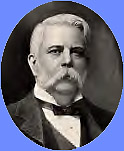 George Westinghouse
George Westinghouse | ALSO IN 1913 . . .
The same year Thomas Mott Osborne voluntarily "did time" in Auburn Prison, including a punishment cell night next to the death chamber, doctors virtually confined to a wheelchair the inventor whose technology made the electric chair possible -- George Westinghouse.
Born on October 6, 1846, in Central Bridge, NY, George's early working
years were spent with his father in Schenectady agricultural machinery shops. After Civil War service, he devoted himself to inventions and industry related to them. In 1869, his first major invention patent led to his founding the Westinghouse Air Brake Company, the first of his many technology related comapnies.
Foreseeing potential in electricity, he formed Westinghouse Electric Company in 1884 and gained rights to a system of alternating current (AC) in 1888.
AC critics, including direct current (DC) proponent Thomas Edison, argued that this cheaper transmission technology was inherently dangerous to the consumer.
Contending the more expensive DC technology was safer, Edison sought to emphasize in the public mind the hazards of alternating current by having New York adopt AC as the method for capital crime electrocutions. He wanted "electrocuted" written and read as "Westinghoused."
George, fighting any association with state-ordered electrocutions, provided high-priced legal counsel to argue against it all the way up to the U.S. Supreme Court on behalf of convicted murderer William Kemmler.
The latter, after the highest court sustained his sentence to be executed by electricity, became in 1890 the first of 55 to die in Auburn's death chamber, on the other side of the wall from which Tom Brown #33,333x spent a night of his voluntary incarceration in 1913.
Showing signs of a heart ailment in 1913, George's doctors ordered complete rest but his deteriorating health soon confined him to a wheelchair. He died on March 12, 1914, sitting in a chair in a New York hotel, the drawings of a new invention he was designing an arm's length away -- for an electric wheelchair!
[Image selection & caption by NYCHS webmaster]
|  Thomas Edison
Thomas Edison |
Of course, I am not so foolish as to think that I can see it from exactly your point of view. Manifestly a man cannot be a real prisoner when he may at any moment let down the bars and walk out; and spending a few hours or days in a cell is quite a different thing from a weary round of weeks, months, years.
Nor is prison a mere matter of clothes, they cannot make a convict any more than they can make a gentleman. I realize perfectly that my point of view cannot be yours; but neither when I go to Paris is my point of view that of a Frenchman. Just as an American may perhaps understand some things about Paris which are not so clear to the average Frenchman, so perhaps a short residence among you here may enable me to judge some things about the Prison System more accurately than those who live too close to the problem to see it in its true perspective.
A word to officials. My plan will not altogether succeed unless I am treated exactly like these other men. . . Relax your regular discipline not a jot because I am here. Give me the same guidance as these others -- but no more. If I offend the rules, deal out to me the same punishment -- I shall expect it.
Here again I do not deceive myself; I realize perfectly that I shall not see the Prison System in quite its normal running order. . . But let me assure you that I come . . . in no sense as a spy upon officers or inmates. . . I come solely to test, so far as I can, the effect of the system upon the mind of the prisoner. I shall study myself, rather than you; or rather, I shall study you through myself.
Perhaps many of you will think, as many outside the walls will think, that at best this action is quixotic -- another "fools errand by one of the fools." I shall not argue the matter further. . . . For somehow, deep down, I have the feeling that after I have really lived among you, marched in your lines, shared your food, gone to the same cells at night, and in the morning looked out at the pieces of God's sunlight through the same iron bars -- that then, and not until then, can I feel the knowledge which will break down the barriers between my soul and the souls of my brothers. . . .
Think of me not as a member of the Prison Reform Commission, nor as a fellow townsman of you officers, but as plain Tom Brown or Jones or Robinson, sent by the courts for some breach of the law and who is no more to you for the present than any other Tom, Dick or Harry. Some day in the future, after I have done my time, perhaps my experience may be of service to you and to the State, but of that we will talk later. In the meantime, help me to learn the truth.
|
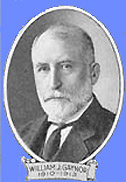
Judge/Mayor Wm. Gaynor | ALSO IN 1913 . . .
Nineteen days before former Auburn Mayor Thomas Mott Osborne began his week within prison walls, NYC Mayor William Jay Gaynor, on a vacation cruise nearing Liverpool, died suddenly from the lingering effects of a would-be assassin's bullet lodged in his throat where surgeons had been unable to remove it.
The shooting had taken place three years earlier on another ship, this one docked at Hoboken, NJ. While Gaynor was talking with aides before starting a vacation cruise, a dismissed municipal docks worker, James J. Gallagher, came behind him, pressed a gun to the mayor's neck and fired. Gaynor was rushed to medical care; the gunman, caught at the scene. Two months later, Gaynor returned to City Hall.
Tammany originally backed Gaynor for mayor to defuse public ire over rampant municipal corruption. But when the former judge began making appointments without regard to patronage mandates from party bosses, Tammany turned hostile.
In a move having the effect, if not also the intent, of distancing itself from any remote hint of involvement in, or approval of the attempted assassination of its nemesis, Tammany's leading State Senator Timothy Daniel Sullivan sponsored what became the toughest handgun licensing law in the nation. Thus was born NY's so-called Sullivan Law.
"Big Tim," variously an assemblyman, state senator, congressman, Democratic national convention delegate, and boss of NYC's East Side, also gave his name to a chain of theatres and vaudeville houses.
His summertime "chowders" featured giveaways to the poor. He ran social programs for his immigrant constituents. His governmental service included progressive legislation. But his reputed financial ties to vice lords cast a shadow over his record.
His death was as dramatic as his life style. In 1913, he was hospitalized for a metal condition (attributed to a physical ailment). But, under escort of nurses, he was taken to his brother's home in Eastchester for visit. Somehow the patient escaped and got onto to some railroad tracks where he was struck and killed by a locomotive, near Pelham Parkway, the Bronx, Aug. 31, 1913.
[Image selection & caption by NYCHS webmaster]
|
. . . I have spoken of the sensitive quickness of the prison audience; I experienced an instance. When the next to the last paragraph of my address was first written, I used the words, "and in the morning looked out at God's sunlight through the same iron bars." Then there had come into my mind the picture made by the grated window, and I added three words so as to read, "looked out at the pieces of God's sunlight."
As I spoke those words, a burst of hearty laughter at the touch of irony came so quickly that I had to wait before finishing the clause; at the close of the sentence, with its note of brotherhood, all laughter ceased at once; and the loudest applause of the morning showed me that what I had said had struck just the right note, and that the help I wanted from the prisoners would not be lacking. . . .
After my address I leave the Prison and proceed to my office where I am interviewed by the representatives of the press. This is a disagreeable duty which I had up to this last moment hoped to escape. . .But the Warden convinced me that secrecy is impossible. . . "You might better see to it that it gets into the newspapers in the shape you want, rather than let it leak out and be misrepresented, intentionally or otherwise." The Warden has the old newspaper man's instinct, and reluctantly I have to admit that his view is correct. . . .
After this I give attention to my private affairs which are arranged for the coming week. Strict orders are issued that no attempt be made to reach me with personal, matters of any sort, except in a case of the most extreme importance. I am to be as completely shut off from the world, from my family and friends, as any regular prisoner. . . .
The plan determined upon with the Warden is that I shall be placed with the Idle Company for the first day or two -- those poor fellows whom I have often seen in the prison yard during the past summer, taking their melancholy exercise by marching aimlessly up and down, and occasionally resting by sitting on their buckets; then along about the third day to go to one of the shops -- which one to be determined later.
ut the Warden told me this afternoon that upon mentioning this plan to one of the officials he had protested. "I shouldn't like to have Mr. Osborne put with that Idle Company. They're the toughest bunch of fellows in the Prison."
"That's just what he wants," was the Warden's reply. . . .
At the same time, I begin to be aware of an ache in one of my teeth where a filling came out some time ago. Luckily I did not say on just what day my term would begin, although of course I've had tomorrow in mind right along. If my toothache gets worse, I can wait over another day and have it attended to. Perhaps, on the whole it would be best to wait over another day. On the other hand, I have an idea that the toothache is nothing but plain cowardice.
As we sit down to dinner, I attempt to be jocular with my youngest. "Well, Golfer," I remark; "this is my last good meal. Tomorrow your father goes to prison for a week!"
"Hm!" responds the interesting youth, "it'll do you good. . . you won't be so fat when you come out."
I'm inclined to think he's right, but it is evident that I need expect no sentimental sympathy from my own family.
Here I close my journal for tonight. I feel decidedly solemn. I wonder how I shall be feeling at this time tomorrow night.
"Tomorrow! Why tomorrow I may be Myself with yesterday's sev'n thousand years."
|





 George Westinghouse
George Westinghouse Thomas Edison
Thomas Edison